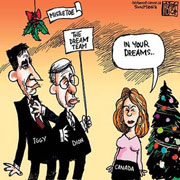Sunday, 10 June 2007
 When something called the Anaheim Ducks beats the Ottawa Senators for the Stanley Cup in five games, you know that NHL hockey has definitively lost its luster as the great Canadian distinction. It may be that Canada will have to start relying instead on its more recent status as the home and native land of many talented humourists in Hollywood and Manhattan. As the summer of 2007 gets into gear, the modern Canadian humour tradition may also be the only domestic resource that can make any sense at all of the modern debate on the reform of the Canadian Senate — which has been going on for more than a quarter of a century now (and in broader perspective reaches much agonizingly further back in time). Laughing to keep from crying, at least, seems the only sane response to the news that the "Harper government is accusing the Liberals of provoking a constitutional crisis over Senate reform." When something called the Anaheim Ducks beats the Ottawa Senators for the Stanley Cup in five games, you know that NHL hockey has definitively lost its luster as the great Canadian distinction. It may be that Canada will have to start relying instead on its more recent status as the home and native land of many talented humourists in Hollywood and Manhattan. As the summer of 2007 gets into gear, the modern Canadian humour tradition may also be the only domestic resource that can make any sense at all of the modern debate on the reform of the Canadian Senate — which has been going on for more than a quarter of a century now (and in broader perspective reaches much agonizingly further back in time). Laughing to keep from crying, at least, seems the only sane response to the news that the "Harper government is accusing the Liberals of provoking a constitutional crisis over Senate reform."
Reviewing the latest deep background : The Harper step-by-step reform legislation — Bill S-4 and Bill C-43
 Apart from the Canadian House of Commons resolution on the Quebecois as a nation within a united Canada, late last year, two pieces of so-called step-by-step Senate reform legislation may finally stand as the most constructive things the Conservative minority government elected last January 23, 2006 has at least tried to do for the future of Canada and the Canadian people. Apart from the Canadian House of Commons resolution on the Quebecois as a nation within a united Canada, late last year, two pieces of so-called step-by-step Senate reform legislation may finally stand as the most constructive things the Conservative minority government elected last January 23, 2006 has at least tried to do for the future of Canada and the Canadian people.
Just to review very quickly, Bill S-4, introduced in the present unreformed Senate on May 30, 2006, sets out to reduce the term for senators appointed by the prime minister to eight years. (Senators currently serve from the date of their appointment until their 75th birthday.) Bill C-43, introduced in the elected Commons on December 13, 2006, prescribes that the prime minister will make all future appointments to the Senate on the basis of "consultations" with voters, which will effectively amount to federal Senate elections.
 Both bills are intended as simply first steps on a longer journey to comprehensive reform at last of the present Senate of Canada — which has been aptly characterized by Prime Minister Harper as "a relic of the 19th century." Both bills are intended as simply first steps on a longer journey to comprehensive reform at last of the present Senate of Canada — which has been aptly characterized by Prime Minister Harper as "a relic of the 19th century."
The trouble with trying to do comprehensive reform all at once is that this requires the sort of constitutional amendment which, under the Constitution Act 1982, must be approved by both the federal Parliament and at least seven provincial legislatures representing 50% of the Canada-wide population. This would mean "opening up the Constitution" again as a federal-provincial issue, as last happened during the ugly days of the Meech Lake and Charlottetown Accords in the late 1980s and early 1990s. And there is a consensus among Canada’s federal and provincial political elites that the country is still not ready to wade once more into this swamp just yet.
 On Prime Minister Harper’s theory of the Constitution, however, neither of Bill S-4 or Bill C-43 requires this kind of provincial consent. They can be passed into law on the authority of the federal Parliament alone. And this means that at least a good start on Senate reform can be made, without waiting until the current federal and provincial political elites believe that the country is ready at last to open up the Constitution again as a federal-provincial issue. On Prime Minister Harper’s theory of the Constitution, however, neither of Bill S-4 or Bill C-43 requires this kind of provincial consent. They can be passed into law on the authority of the federal Parliament alone. And this means that at least a good start on Senate reform can be made, without waiting until the current federal and provincial political elites believe that the country is ready at last to open up the Constitution again as a federal-provincial issue.
If you believe that Senate reform is actually quite important for the Canadian future (as strange a concept as that may seem from the standpoint of, say, the more newsworthy North American trials of Paris Hilton), Mr. Harper’s theory is bound to impress you in some degree. Not only do Bills S-4 and C-43 get the ball rolling practically, after a quarter century of never-ending modern debate, if both were to become law they would almost certainly add to the practical pressure for more comprehensive reform in the near enough future.
The alleged crisis — what has happened now?
 You probably have to believe very profoundly in the importance of Senate reform for the Canadian future to seriously notice the current alleged crisis in Mr. Harper’s step-by-step Senate reform plots. But in the first instance it turns around the fate of Bill S-4 in the current unreformed Senate. And for those who are interested John Ivison at the National Post summarized the story provocatively on Friday, June 8, 2007: You probably have to believe very profoundly in the importance of Senate reform for the Canadian future to seriously notice the current alleged crisis in Mr. Harper’s step-by-step Senate reform plots. But in the first instance it turns around the fate of Bill S-4 in the current unreformed Senate. And for those who are interested John Ivison at the National Post summarized the story provocatively on Friday, June 8, 2007:
"Asking senators to reform the Senate is like asking an alcoholic to blow up a brewery, so it should come as no surprise that the dozing denizens of the Red Chamber have stalled the Prime Minister's year-long attempt to introduce eight-year term limits ... Marjory LeBreton, the Conservative leader in the Senate, complained yesterday that the Liberal senators on the constitutional affairs committee are ‘holding the government hostage.’ She said the Liberals have overstepped their constitutional authority by recommending that the term-limit bill be suspended until Stephen Harper refers it to the Supreme Court to get a ruling on whether it is constitutionally sound" [i.e. whether it can in fact be passed by the federal Parliament alone, without the approval of seven provinces representing 50% of the Canada-wide population.]
 Or, as explained by Campbell Clark in the June 8 Globe and Mail: "The Conservative government has accused Liberal senators of mounting an unconstitutional power grab in stalling a bill to limit Senate terms ... The Liberal majority in the Senate is refusing to pass a bill limiting senators' terms to eight years unless the government agrees to refer it to the Supreme Court to determine whether it is constitutional. They say there are doubts about whether the provinces must approve the change." Or, as explained by Campbell Clark in the June 8 Globe and Mail: "The Conservative government has accused Liberal senators of mounting an unconstitutional power grab in stalling a bill to limit Senate terms ... The Liberal majority in the Senate is refusing to pass a bill limiting senators' terms to eight years unless the government agrees to refer it to the Supreme Court to determine whether it is constitutional. They say there are doubts about whether the provinces must approve the change."
Mr. Clark then went on: "But Government House Leader Peter Van Loan, seeking to raise the political stakes in the impasse, yesterday accused the unelected senators of trying to usurp powers that belong to the government ... ‘The actions of unelected, unaccountable Liberal senators represents a dangerous grasp for power that is clearly extraconstitutional,’ he charged in the Commons ... Mr. Van Loan told reporters later that the cabinet, not the Senate, has the power to refer matters to the Supreme Court. And he said that the Senate's decision to sit on the bill ‘is a very, very dangerous precedent, because it creates the opportunity for the Senate ...to compel this kind of reference, which has never been the nature of our Constitution.’"
Can Senate reform really be a big election issue?
 John Ivison is not the only press pundit to observe that "the indignation from the [Conservative] government side" on all this "lacks authenticity." Jack Aubry of CanWest News Service has also pointed out that other "pundits are bemused by the political machinations that have been grinding away in the usually staid upper house. They say ... that the Conservatives were expressing mock outrage when they accused the Liberals of mounting an unconstitutional power grab." John Ivison is not the only press pundit to observe that "the indignation from the [Conservative] government side" on all this "lacks authenticity." Jack Aubry of CanWest News Service has also pointed out that other "pundits are bemused by the political machinations that have been grinding away in the usually staid upper house. They say ... that the Conservatives were expressing mock outrage when they accused the Liberals of mounting an unconstitutional power grab."
In some quarters, that is to say, it has been urged for some time that Mr. Harper’s party sees all and any signs of Liberal intransigence over Conservative plans for step-by-step Senate reform as a winning issue in the next federal election, whenever it may come. "Conservative focus groups" have "reportedly suggested that when voters are asked what bothers them about Ottawa, the Senate quickly emerges as a symbol of elitism, patronage and entitlement." And "the latest Conservative attack ads ... highlighted Liberal obstruction of Senate reform even before it became a reality" (with the early June 2007 recommendation, by Liberal senators on the constitutional affairs committee, that "the term-limit bill [S-4] be suspended until Stephen Harper refers it to the Supreme Court to get a ruling on whether it is constitutionally sound").
 Liberal Senator John Bryden, on the other hand (to take just one of many similar cases) has said: "I hope ... that Prime Minister Harper wants to run against the Senate because the people of Canada think there are many, many issues in this country that take a lot of precedence over the Senate." Mr. Bryden has noted as well that the provincial "governments of Ontario, Quebec, New Brunswick and Newfoundland" have also recently raised their own doubts about the constitutionality of Bill S-4 (and in some cases Bill C-43 too). Liberal Senator John Bryden, on the other hand (to take just one of many similar cases) has said: "I hope ... that Prime Minister Harper wants to run against the Senate because the people of Canada think there are many, many issues in this country that take a lot of precedence over the Senate." Mr. Bryden has noted as well that the provincial "governments of Ontario, Quebec, New Brunswick and Newfoundland" have also recently raised their own doubts about the constitutionality of Bill S-4 (and in some cases Bill C-43 too).
Yet when you really ponder the imponderable depths of confusion that typically surround almost all debate on Senate reform in Canada, the most fundamental problem with Senate reform as a winning Conservative issue in the next federal election is probably something else again. Specifically, the present unreformed Senate (with its Liberal majority — in testament to how much more often Liberals have formed governments entitled to appoint senators in the more recent past) can only be seriously accused of "obstructing" Bill S-4 (or Bill C-43 for that matter), if Mr. Harper’s Conservative minority government has some realistic prospect of successfully proceeding with this legislation outside the Senate.
 More exactly again, if Bill S-4 (or C-43) had already been passed by a majority of members in the elected Canadian House of Commons, and then the Senate stalled or refused to approve the legislation until the Supreme Court had ruled on its constitutionality, that would constitute a real "constitutional crisis." In that case what Mr. Van Loan calls the "actions of unelected, unaccountable Liberal senators" would be seriously and practically obstructing the wishes of a majority of the members of the current democratically elected branch of Parliament. And that would be something about which those of us who actually do believe that Mr. Harper’s Bills S-4 and C-43 are constructive first steps towards a better future for Canada and the Canadian people could reasonably be outraged — and even perhaps something that we might reasonably resolve to stamp out aggressively the next time we visit the federal ballot box. More exactly again, if Bill S-4 (or C-43) had already been passed by a majority of members in the elected Canadian House of Commons, and then the Senate stalled or refused to approve the legislation until the Supreme Court had ruled on its constitutionality, that would constitute a real "constitutional crisis." In that case what Mr. Van Loan calls the "actions of unelected, unaccountable Liberal senators" would be seriously and practically obstructing the wishes of a majority of the members of the current democratically elected branch of Parliament. And that would be something about which those of us who actually do believe that Mr. Harper’s Bills S-4 and C-43 are constructive first steps towards a better future for Canada and the Canadian people could reasonably be outraged — and even perhaps something that we might reasonably resolve to stamp out aggressively the next time we visit the federal ballot box.
As matters stand, however, it seems very close to certain that Bill C-43 cannot win the support of a majority of members of the present elected Commons (or common house, as the Canadian humourist of yesteryear Charlie Farquharson used to say). It was introduced in the House this past December, and has been debated on three occasions this spring. It has now stalled in the House because it seems clear that a majority of elected MPs will not support it.
 Bill S-4 was introduced by Mr. Harper’s government in the Senate rather than the House — for reasons that still seem to some a little suspicious. Marjory LeBreton, the Conservative leader in the Senate, has explained that: "We introduced this government bill in the Senate because we felt it would be the appropriate place to introduce it. It affects this chamber more directly." But this argument would also seem to apply with virtually the same force to Bill C-43, which Mr. Harper’s government introduced in the Commons. (And the suspicion is that Bill S-4 was introduced in the Senate largely to set the stage for just the kind of pseudo-constitutional political hi-jinks that have now began to unfold in depth — or so some would say.) Bill S-4 was introduced by Mr. Harper’s government in the Senate rather than the House — for reasons that still seem to some a little suspicious. Marjory LeBreton, the Conservative leader in the Senate, has explained that: "We introduced this government bill in the Senate because we felt it would be the appropriate place to introduce it. It affects this chamber more directly." But this argument would also seem to apply with virtually the same force to Bill C-43, which Mr. Harper’s government introduced in the Commons. (And the suspicion is that Bill S-4 was introduced in the Senate largely to set the stage for just the kind of pseudo-constitutional political hi-jinks that have now began to unfold in depth — or so some would say.)
As of this moment Bill S-4 has not even been raised or otherwise officially discussed in the elected Commons, pending its fate in the Senate. Current readings of at least the most apparent Ottawa tea leaves from a distance would seem to suggest that its most likely fate in the present elected branch of Parliament is somewhat less clear than that of Bill C-43. But at best it is far from certain that Bill S-4 (and especially in its present exact form) can win the support of a majority of members of the present elected Commons either. And if it cannot do so then its fate in the Senate is strictly academic — and far from any kind of constitutional crisis. The Senate cannot be realistically said to be obstructing legislation that Mr. Harper’s minority government can’t get through the democratically elected branch of Parliament in any case. (And Mr. Van Loan’s talk about how "the cabinet, not the Senate, has the power to refer matters to the Supreme Court," and how "the Senate's decision to sit on" Bill S-4 "is a very, very dangerous precedent," is a little too much like arguing over how many angels can fit on the head of a pin.)
Do the Liberals need a better Senate reform policy anyway?
 The current tempest in an Ottawa teapot over Bill S-4 finally seems to illustrate the extent to which Canadian federal politics has now dissolved into a state of near-total hilarity, in a number of ways. The current tempest in an Ottawa teapot over Bill S-4 finally seems to illustrate the extent to which Canadian federal politics has now dissolved into a state of near-total hilarity, in a number of ways.
To start with, it is more than arguable, from some olympian nation-building perspective, that Mr. Harper really does have the high ground with both Bill S-4 and Bill C-43. In the year 2007 these are very worthwhile things to be trying to do, in the interests of a better future for Canada and the Canadian people. If it is true that there is no majority for either bill in the current elected Parliament of Canada, that could be — again from a quite high-minded point of view — a rather good argument for giving Mr. Harper his own reliable majority in the next federal election.
 Yet in order to take advantage of this high ground, Mr. Harper himself must act in a consistently high-minded way on the issue. He could, e.g., introduce both bills in the elected House — and urge that the issues involved transcend partisan politics, and do his best to reach out to other parties for the majority support he needs. If neither bill can pass, then he has his argument for a majority in the next election, couched in some suitably high-minded way, that can appeal directly to those focus group voters who, when asked what bothers them about Ottawa, quickly raise the Senate "as a symbol of elitism, patronage and entitlement." Yet in order to take advantage of this high ground, Mr. Harper himself must act in a consistently high-minded way on the issue. He could, e.g., introduce both bills in the elected House — and urge that the issues involved transcend partisan politics, and do his best to reach out to other parties for the majority support he needs. If neither bill can pass, then he has his argument for a majority in the next election, couched in some suitably high-minded way, that can appeal directly to those focus group voters who, when asked what bothers them about Ottawa, quickly raise the Senate "as a symbol of elitism, patronage and entitlement."
For better or worse, however, acting in a consistently high-minded way on almost any issue ultimately seems a little too far outside Mr. Harper’s political experience — and his conception of the democratic politician’s art. And this may even be his most damaging flaw in the real world of practical politics too. By introducing Bill S-4 in the Senate, and then trying to manufacture some pseudo-constitutional crisis out of the present unreformed Senate’s problems with the bill, Mr. Harper is throwing away almost all his good cards on the issue, just as the game begins. (As John Ivison points out: "Asking senators to reform the Senate is like asking an alcoholic to blow up a brewery, so it should come as no surprise that the dozing denizens of the Red Chamber have stalled the Prime Minister's year-long attempt to introduce eight-year term limits.")
 If you are a Liberal (or BQ or NDP or even Green) supporter, you might just ask, well, what is the problem with that? This is finally good news for the Liberals (and other opposition parties) — no? But the most probably correct answer here would also seem to be no, it is not. As in the more general case as well, the problem with Canadian federal politics right now is not just that Stephen Harper’s Conservatives are showing a few too many ultimately humourous weaknesses and vulnerabilities. The Liberals (and again the Bloc and the New Democrats too) are in at least just as bad (or hilarious) a state at the moment. If you are a Liberal (or BQ or NDP or even Green) supporter, you might just ask, well, what is the problem with that? This is finally good news for the Liberals (and other opposition parties) — no? But the most probably correct answer here would also seem to be no, it is not. As in the more general case as well, the problem with Canadian federal politics right now is not just that Stephen Harper’s Conservatives are showing a few too many ultimately humourous weaknesses and vulnerabilities. The Liberals (and again the Bloc and the New Democrats too) are in at least just as bad (or hilarious) a state at the moment.
The federal Liberals in particular are either unwilling or perhaps even unable to grasp the extent to which the Harper Conservatives do (or did to start with) have the high ground with Bills S-4 and C-43. The one serious substantive Liberal contribution to the Senate debate on Bill S-4 — supported apparently by party leader Stephane Dion in the House as well — has been to argue that the senatorial term limit should be extended from eight to 12 or even 15 years.
 The logic behind this position, it would seem, is that if both Bills S-4 and C-43 pass in their present exact forms, the point at which the current Senate would become effectively elected rather than appointed — and thus the point at which the pressure for more comprehensive Senate reform would crystallize very decisively — will come much sooner rather than much later. By extending the terms of newly elected senators, the decisive day of reckoning is put off that much further into the future. And this is said to a good thing because the whole question of comprehensive Senate reform can only destabilize the present Canadian federation. Or, as Stephane Dion memorably summarized the broader point early on in his Liberal leadership campaign of last year, "Canada is a country that works in practice but not in theory." The logic behind this position, it would seem, is that if both Bills S-4 and C-43 pass in their present exact forms, the point at which the current Senate would become effectively elected rather than appointed — and thus the point at which the pressure for more comprehensive Senate reform would crystallize very decisively — will come much sooner rather than much later. By extending the terms of newly elected senators, the decisive day of reckoning is put off that much further into the future. And this is said to a good thing because the whole question of comprehensive Senate reform can only destabilize the present Canadian federation. Or, as Stephane Dion memorably summarized the broader point early on in his Liberal leadership campaign of last year, "Canada is a country that works in practice but not in theory."
But the trouble with all this is that it is the all too uncourageous and wimpy voice of the old Canadian past. (Mackenzie King, "conscription if necessary but not necessarily conscription," and all that.) And in this context at least (if not at all in so many others) Stephen Harper looks much more like the new voice of a bolder and more confident and forward-looking Canadian future. Or, you might even say, it is the Conservative leader Stephen Harper and not the Liberal leader Stephane Dion who looks like the real successor of the bold and brave Pierre Trudeau, whose Constitution Act 1982 at last opened up some light at the end of the tunnel for Canada today in the first place — and finally put the challenge of further comprehensive constitutional reform on a more forward-looking Canadian federal agenda, and so forth, on and on.
 In fact, if both Bills S-4 and C-43 actually were to become the law of the land during the 39th Parliament of Canada, only two or perhaps at most three further steps would be required for comprehensive Senate reform. And the most crucial — if still very contentious — step involves figuring out some rational way of assigning seats in a reformed Senate to the provinces (the present assignment, essentially devised for the quite different Canada of the later 19th century, being at best quite irrationally out of date). In fact, if both Bills S-4 and C-43 actually were to become the law of the land during the 39th Parliament of Canada, only two or perhaps at most three further steps would be required for comprehensive Senate reform. And the most crucial — if still very contentious — step involves figuring out some rational way of assigning seats in a reformed Senate to the provinces (the present assignment, essentially devised for the quite different Canada of the later 19th century, being at best quite irrationally out of date).
More than 25 years of modern debate at least ought to have clarified by now that the present US and Australian practice of assigning equal numbers of seats to each province (or state in their federal systems) — as enshrined in the original Alberta so-called "Triple E" model — just will not work in the present-day bilingual and multicultural Canada’s unique circumstances. One key reason for this is that an elected, effective, and (provincially) equal reformed Senate in Canada would rub just too much against the grain of the unique circumstances of both Quebec and Ontario in today’s Canadian federation. And this is one key reason that the provincial governments of both Quebec and Ontario have raised their own objections to Bills S-4 and C-43.
 Yet there are still many conceivable opportunities for creative expressions of the free and democratic politician’s art on the question of provincial representation in Canadian Senate reform. A reformed Senate, e.g., that guaranteed Quebec, say, 25% of the new seats could be one way of putting flesh on the abstract proposition that the Quebecois constitute a nation within a united Canada — that (all initial appearances to the contrary notwithstanding) could finally prove very good for the future of both Quebec and the rest of Canada. A similarly reformed Senate that assigned each province outside Quebec with more than 10% of the Canada-wide population twice as many seats as other provinces outside Quebec might similarly redress current concerns about future Senate representation in all of Ontario, British Columbia, and Alberta. Special representation for the aboriginal peoples of Canada in a reformed Senate could make a great deal of sense for the future of Canada and the Canadian people too — and so forth. Yet there are still many conceivable opportunities for creative expressions of the free and democratic politician’s art on the question of provincial representation in Canadian Senate reform. A reformed Senate, e.g., that guaranteed Quebec, say, 25% of the new seats could be one way of putting flesh on the abstract proposition that the Quebecois constitute a nation within a united Canada — that (all initial appearances to the contrary notwithstanding) could finally prove very good for the future of both Quebec and the rest of Canada. A similarly reformed Senate that assigned each province outside Quebec with more than 10% of the Canada-wide population twice as many seats as other provinces outside Quebec might similarly redress current concerns about future Senate representation in all of Ontario, British Columbia, and Alberta. Special representation for the aboriginal peoples of Canada in a reformed Senate could make a great deal of sense for the future of Canada and the Canadian people too — and so forth.
 As matters stand, the federal Liberals (say whatever else you wish) do just look like old-hat Ottawa politicians who are stalling on Stephen Harper’s high-minded proposals for getting started on step-by-step Senate reform — even if Mr. Harper is also proving himself ultimately incapable of following through on his own high-minded instincts in a convincing and consistently high-minded way. As matters stand, the federal Liberals (say whatever else you wish) do just look like old-hat Ottawa politicians who are stalling on Stephen Harper’s high-minded proposals for getting started on step-by-step Senate reform — even if Mr. Harper is also proving himself ultimately incapable of following through on his own high-minded instincts in a convincing and consistently high-minded way.
Here as perhaps elsewhere, however, the Liberals’ inability to capitalize on Mr. Harper’s inability to shed his more low-minded political instincts in the end — as a result of their own inability to rise above the narrow parameters of their own most dreary and overcautious traditions — ultimately just seems to dissolve current Canadian federal politics into a comedic melodrama on existential angst in small-minded capital cities.
 The good news of course is that the full depths of the summer will be here very soon. And away at the beach on any one of Canada’s many dazzling bodies of fresh and/or salt water, there will be time to remember how there are many far worse fates in the global village today than living in a country most noted for the hilarity of its official political life. Laughing to keep from crying may finally be the most high-minded response for we mere Canadian voters, as we struggle to understand a geography we never made, and a country we can only hope and pray will still be around for our grandchildren to marvel at in the longest future. The good news of course is that the full depths of the summer will be here very soon. And away at the beach on any one of Canada’s many dazzling bodies of fresh and/or salt water, there will be time to remember how there are many far worse fates in the global village today than living in a country most noted for the hilarity of its official political life. Laughing to keep from crying may finally be the most high-minded response for we mere Canadian voters, as we struggle to understand a geography we never made, and a country we can only hope and pray will still be around for our grandchildren to marvel at in the longest future.
Meanwhile, the best advice about Senate reform for all our federal and provincial politicians probably comes from the present-day central Canadian comedian Red Green: "Keep your stick on the ice."
Randall White is the author of a number of books on Canadian history and politics, including Voice of Region: The Long Journey to Senate Reform in Canada. For his November 2007 counterweights update on the further adventures of the Senate reform issue in Ottawa and elsewhere in the country, CLICK HERE. Only registered users can write comments.
Please login or register. Powered by AkoComment 1.0 beta 2!
|
